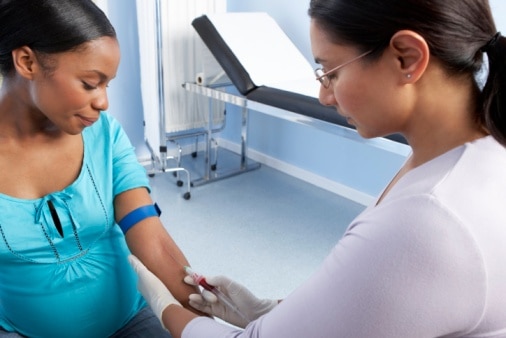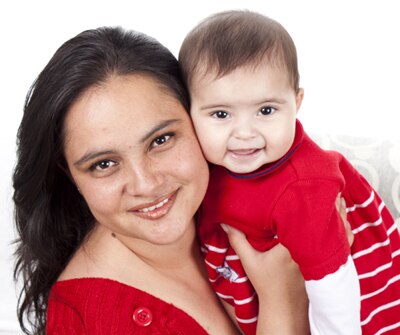Gestational Diabetes
- Definition & Facts
- Symptoms & Causes
- Tests & Diagnosis
- Management & Treatment
- Prevention
- After Your Baby is Born
Definition & Facts
What is gestational diabetes?
Gestational diabetes is a type of diabetes that develops during pregnancy. Diabetes means your blood glucose, also called blood sugar, is too high. Too much glucose in your blood is not good for you or your baby.
Gestational diabetes is usually diagnosed in the 24th to 28th week of pregnancy. Managing your gestational diabetes can help you and your baby stay healthy. You can protect your own and your baby’s health by taking action right away to manage your blood glucose levels.
How can gestational diabetes affect my baby?
High blood glucose levels during pregnancy can cause problems for your baby, such as
- being born too early
- weighing too much, which can make delivery difficult and injure your baby
- having low blood glucose, also called hypoglycemia, right after birth
- having breathing problems
High blood glucose also can increase the chance that you will have a miscarriage or a stillborn baby.1 Stillborn means the baby dies in the womb during the second half of pregnancy.
Your baby also will be more likely to become overweight and develop type 2 diabetes as he or she gets older.
How can gestational diabetes affect me?
If you have gestational diabetes, you are more likely to develop preeclampsia, which is when you develop high blood pressure and too much protein in your urine during the second half of pregnancy.
Preeclampsia can cause serious or life-threatening problems for you and your baby. The only cure for preeclampsia is to give birth. If you have preeclampsia and have reached 37 weeks of pregnancy, your doctor may want to deliver your baby early. Before 37 weeks, you and your doctor may consider other options to help your baby develop as much as possible before he or she is born. Learn more about preeclampsia.
Gestational diabetes may increase your chance of having a cesarean section, also called a C-section, because your baby may be large. A C-section is major surgery.
If you have gestational diabetes, you are more likely to develop type 2 diabetes later in life. Over time, having too much glucose in your blood can cause health problems such as diabetic retinopathy, heart disease, kidney disease, and nerve damage. You can take steps to help prevent or delay type 2 diabetes.
References
Symptoms & Causes
What are the symptoms of gestational diabetes?
Usually, gestational diabetes has no symptoms. If you do have symptoms, they may be mild, such as being thirstier than normal or having to urinate more often.
What causes gestational diabetes?
Gestational diabetes occurs when your body can’t make the extra insulin needed during pregnancy. Insulin, a hormone made in your pancreas, helps your body use glucose for energy and helps control your blood glucose levels.
During pregnancy, your body makes special hormones and goes through other changes, such as weight gain. Because of these changes, your body’s cells don’t use insulin well, a condition called insulin resistance. All pregnant women have some insulin resistance during late pregnancy. Most pregnant women can produce enough insulin to overcome insulin resistance, but some cannot. These women develop gestational diabetes.

Being overweight or having obesity is linked to gestational diabetes. Women who are overweight or have obesity may already have insulin resistance when they become pregnant. Gaining too much weight during pregnancy may also be a factor.
Having a family history of diabetes makes it more likely that a woman will develop gestational diabetes, which suggests that genes play a role.
Tests & Diagnosis
When will I be tested for gestational diabetes?
Testing for gestational diabetes usually occurs between 24 and 28 weeks of pregnancy.
If you have an increased chance of developing gestational diabetes, your doctor may test for diabetes during the first visit after you become pregnant.
How do doctors diagnose gestational diabetes?
Doctors use blood tests to diagnose gestational diabetes. You may have the glucose challenge test, the oral glucose tolerance test, or both. These tests show how well your body uses glucose.

Glucose Challenge Test
You may have the glucose challenge test first. Another name for this blood test is the glucose screening test. In this test, a health care professional will draw your blood 1 hour after you drink a sweet liquid containing glucose. You do not need to fast for this test. Fasting means having nothing to eat or drink except water. If your blood glucose is too high—140 or more—you may need to return for an oral glucose tolerance test while fasting. If your blood glucose is 200 or more, you may have type 2 diabetes.
Oral Glucose Tolerance Test (OGTT)
The OGTT measures blood glucose after you fast for at least 8 hours. First, a health care professional will draw your blood. Then you will drink the liquid containing glucose. You will need your blood drawn every hour for 2 to 3 hours for a doctor to diagnose gestational diabetes.
High blood glucose levels at any two or more blood test times—fasting, 1 hour, 2 hours, or 3 hours—mean you have gestational diabetes. Your health care team will explain what your OGTT results mean.
Your health care professional may recommend an OGTT without first having the glucose challenge test.
Management & Treatment
How can I manage my gestational diabetes?
Many women with gestational diabetes can manage their blood glucose levels by following a healthy eating plan and being physically active. Some women also may need diabetes medicine.
Follow a healthy eating plan
Your health care team will help you make a healthy eating plan with food choices that are good for you and your baby. The plan will help you know which foods to eat, how much to eat, and when to eat. Food choices, amounts, and timing are all important in keeping your blood glucose levels in your target range.

If you’re not eating enough or your blood glucose is too high, your body might make ketones. Ketones in your urine or blood mean your body is using fat for energy instead of glucose. Burning large amounts of fat instead of glucose can be harmful to your health and your baby’s health.
Your doctor might recommend you test your urine or blood daily for ketones or when your blood glucose is above a certain level, such as 200. If your ketone levels are high, your doctor may suggest that you change the type or amount of food you eat. Or, you may need to change your meal or snack times.
Be physically active
Physical activity can help you reach your target blood glucose levels. If your blood pressure or cholesterol levels are too high, being physically active can help you reach healthy levels. Physical activity can also relieve stress, strengthen your heart and bones, improve muscle strength, and keep your joints flexible. Being physically active will also help lower your chances of having type 2 diabetes in the future.
Talk with your health care team about what activities are best for you during your pregnancy. Aim for 30 minutes of activity 5 days of the week, even if you weren’t active before your pregnancy.2 If you are already active, tell your doctor what you do. Ask your doctor if you may continue some higher intensity activities, such as lifting weights or jogging.
Read tips on how to eat better and be more active while you are pregnant and after your baby is born.
How will I know whether my blood glucose levels are on target?
Your health care team may ask you to use a blood glucose meter to check your blood glucose levels. This device uses a small drop of blood from your finger to measure your blood glucose level. Your health care team can show you how to use your meter.
Recommended daily target blood glucose levels for most women with gestational diabetes are
- Before meals, at bedtime, and overnight: 95 or less
- 1 hour after eating: 140 or less
- 2 hours after eating: 120 or less3
Ask your doctor what targets are right for you.

You can keep track of your blood glucose levels using My Daily Blood Glucose Record (PDF, 45 KB) . You can also use an electronic blood glucose tracking system on your computer or mobile device. Record the results every time you check your blood glucose. Your blood glucose records can help you and your health care team decide whether your diabetes care plan is working. Take your tracker with you when you visit your health care team.
How is gestational diabetes treated if diet and physical activity aren’t enough?
If following your eating plan and being physically active aren’t enough to keep your blood glucose levels in your target range, you may need insulin.
If you need to use insulin, your health care team will show you how to give yourself insulin shots. Insulin will not harm your baby and is usually the first choice of diabetes medicine for gestational diabetes. Researchers are studying the safety of the diabetes pills metformin and glyburide during pregnancy, but more long-term studies are needed. Talk with your health care professional about what treatment is right for you.
References
Prevention
What increases my chance of developing gestational diabetes?
Your chance of developing gestational diabetes are higher if you
- are overweight
- had gestational diabetes before
- have a parent, brother, or sister with type 2 diabetes
- have prediabetes, meaning your blood glucose levels are higher than normal yet not high enough for a diagnosis of diabetes
- are African American, American Indian, Asian American, Hispanic/Latina, or Pacific Islander American
- have a hormonal disorder called polycystic ovary syndrome, also known as PCOS

How can I lower my chance of developing gestational diabetes?
If you are thinking about becoming pregnant and are overweight, you can lower your chance of developing gestational diabetes by losing extra weight and increasing physical activity before you become pregnant. Taking these steps can improve how your body uses insulin and help your blood glucose levels stay normal.
Once you are pregnant, don’t try to lose weight. You need to gain some weight for your baby to be healthy. However, gaining too much weight too quickly may increase your chance of developing gestational diabetes. Ask your doctor how much weight gain and physical activity during pregnancy are right for you.
After Your Baby is Born
After I have my baby, how can I find out whether I have diabetes?
You should get tested for diabetes no later than 12 weeks after your baby is born. If your blood glucose is still high, you may have type 2 diabetes. Even if your blood glucose is normal, you still have a greater chance of developing type 2 diabetes in the future. Therefore, you should be tested for diabetes every 3 years.
How can I prevent or delay type 2 diabetes later in life?
You can do a lot to prevent or delay type 2 diabetes. Here are steps you should take if you had gestational diabetes:
- Be more active and make healthy food choices to get back to a healthy weight.
- Breastfeed your baby. Breastfeeding gives your baby the right balance of nutrients and helps you burn calories.
- If your test results show that you could get diabetes and you are overweight, ask your doctor about what changes you can make to lose weight and for help in making them. Your doctor may recommend that you take medicine such as metformin to help prevent type 2 diabetes.
Learn more about preventing type 2 diabetes.

How can I help my child be healthy?
You can help your child be healthy by showing him or her how to make healthy lifestyle choices, including
- being physically active
- limiting time watching TV, playing video games, or using a mobile device or computer
- making healthy food choices
- staying at a healthy weight
Making healthy choices helps the whole family and may protect your child from developing obesity or diabetes later in life.
Learn more about helping your child develop healthy habits.
This content is provided as a service of the National Institute of Diabetes and Digestive and Kidney Diseases
(NIDDK), part of the National Institutes of Health. NIDDK translates and disseminates research findings to increase knowledge and understanding about health and disease among patients, health professionals, and the public. Content produced by NIDDK is carefully reviewed by NIDDK scientists and other experts.
The NIDDK would like to thank:
Boyd Metzger, M.D., Northwestern University

